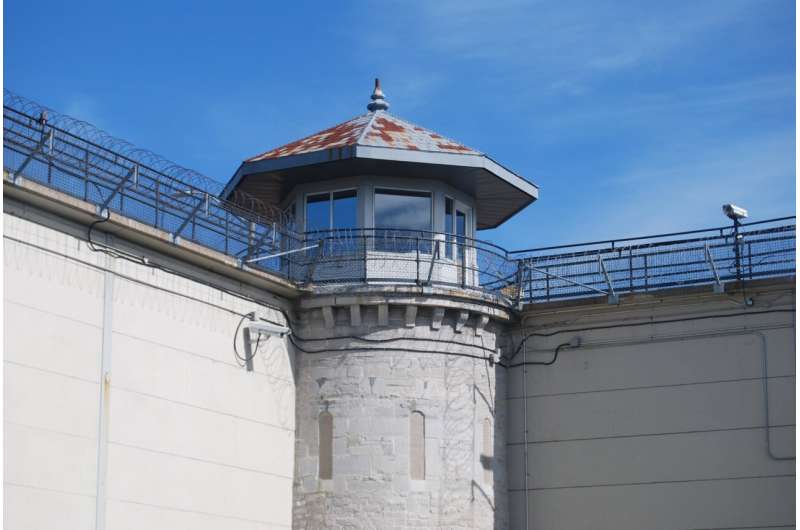Study: Features of prison subcultures in Canada mitigate radicalized and extremist messaging

Prison subcultures have been described as antisocial, with ties to violence and gang membership. In extreme cases, research has also suggested that prison subcultures contribute to incarcerated people joining radical groups or embracing violent extremist beliefs. A new study examined the relation between prison subcultures and prison radicalization based on interviews with incarcerated men and correctional officers in Canada. The study found that several features of these subcultures make incarcerated Canadians resilient to radicalized and extremist messaging.
The study, by researchers at the University of Alberta (UofA), appears in Criminology, a publication of the American Society of Criminology.
“Many studies have been done to help understand how prison radicalization works,” explains Sandra M. Bucerius, professor of sociology at UofA, who led the study. “But none has contemplated how radicalization interacts with broader features of prison life or whether such features limit or interrupt extremist messages.”
Academics and policymakers have long discussed the scope, pace, and dynamics of radicalization in prisons. While some see prison radicalization as a pressing concern, others suggest that the nexus between prison and radicalization is greatly exaggerated. Radicalization is a broadly defined concept that is understood differently depending on the institutional setting. And research on this issue is largely based on presuppositions around institutional characteristics that foster radicalization.
In this study, researchers asked: If the dynamics of prison subcultures can help foster radicalization, could the distinctive norms, beliefs, and behavioral expectations of those subcultures mitigate and impede the radicalization process?
To examine that possibility, the researchers interviewed nearly 150 incarcerated men (primarily White and Indigenous) and more than 130 correctional officers in four provincial/territorial prisons in western Canada. They used the Royal Canadian Mounted Police’s definition of radicalization: “the process by which individuals are introduced to an overtly ideological message and belief system that encourages movement from moderate, mainstream beliefs toward extreme views.”
Based on the interviews, the study found little evidence of systematic radicalization in the prisons, which is consistent with what other North American studies have found. The researchers identified three vital but often overlooked factors that appear to hinder or mitigate radicalization:
- Multicultural and anti-racist beliefs: The incarcerated people studied had broadly prosocial values about multiculturalism and were open to and tolerant of other cultures and races, and unlikely to stand by idly if perceived radicals discriminated against or voiced hatred toward others.
- The presence of racial groups aligned against radicalization: Study participants had opportunities to gather across racial and ethnic groups, which may have offered them more opportunities to share views, exchange opinions, and form mutual resilience against radical groups; this practice runs counter to what typically occurs in U.S. prisons.
- Incarcerated individuals’ actions as informants: The admonition to inmates to minimize interactions with correctional officers was more flexible when it pertained to communications about potential radical or extremist incarcerated people.
The study’s authors note that inmates’ resiliency toward radicalization did not come from official anti-radicalization initiatives. Rather, participants pointed to local prison subcultures as factors that impeded the spread of radicalized messages.
“Our findings highlight the importance of considering broader sociocultural influences when trying to understand the relation between radicalization and prisons’ dynamics and politics,” notes William Schultz, assistant professor of criminology and sociology at UofA, who coauthored the study.
Among the limitations of the study, the authors note that interviews were done in institutions where people typically stayed for less than two years, so the findings cannot be applied to subcultures in prisons where people typically stay for longer periods. Similarly, people incarcerated for short periods may retain connections to deeply held community values, which may not be the case among people held for longer periods. Finally, because of the unique attributes of Canadian culture (e.g., prosocial values, tolerance), the findings cannot be generalized to prisons in other countries.
“The best approach to conceptualizing, addressing, and perhaps reducing prison radicalization need not necessarily focus on the prison itself,” suggests Kevin D. Haggerty, professor of sociology at UofA, who coauthored the study. “Larger social and cultural pressures shape radicalization in prison, meaning that the wider society conditions prison as a site of radicalization.”
More information:
Sandra M. Bucerius et al, “That shit doesn’t fly”: Subcultural constraints on prison radicalization, Criminology (2023). DOI: 10.1111/1745-9125.12327
Provided by
American Society of Criminology
Citation:
Study: Features of prison subcultures in Canada mitigate radicalized and extremist messaging (2023, January 18)
retrieved 18 January 2023
from https://phys.org/news/2023-01-features-prison-subcultures-canada-mitigate.html
This document is subject to copyright. Apart from any fair dealing for the purpose of private study or research, no
part may be reproduced without the written permission. The content is provided for information purposes only.
For all the latest Science News Click Here
For the latest news and updates, follow us on Google News.

